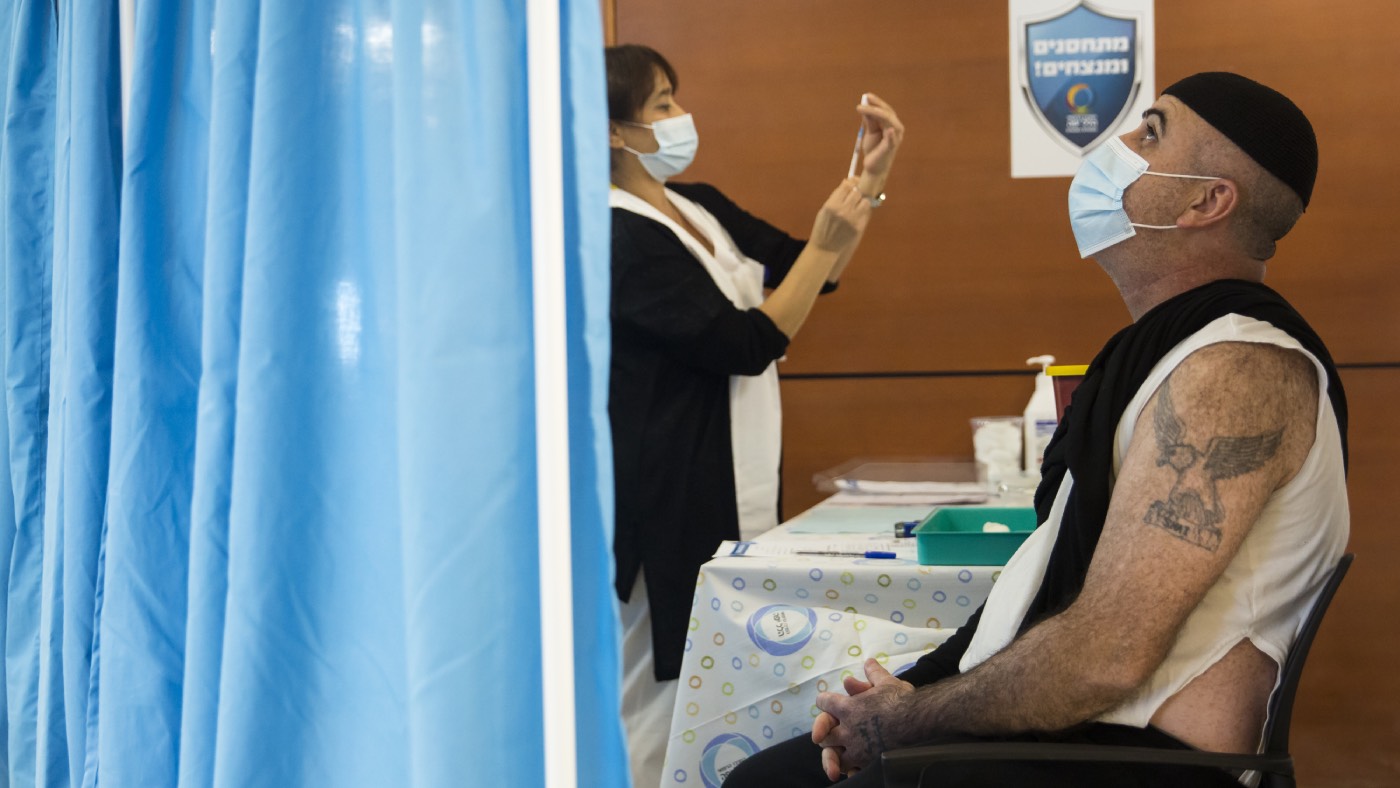What the UK can learn from the speedy Israeli vaccine rollout
Analysis of data casts doubt on one-jab approach despite falling infection rates

A free daily email with the biggest news stories of the day – and the best features from TheWeek.com
You are now subscribed
Your newsletter sign-up was successful
Experts are picking over the findings of research into Israel’s Covid-19 vaccine rollout after Health Secretary Matt Hancock turned to his Israeli counterpart for tips from the country that is leading the immunisation race.
Hancock and Israeli Health Minister Yuli Edelstein have spoken to “share best practice and to up the pace” of Britain’s rollout, The Sun reports. The Israeli jabs campaign is being held up as an example worldwide, with one in four members of the population now having received a first dose.
The UK’s vaccines minister, Nadhim Zahawi, told ITV’s Good Morning Britain earlier this month that Downing Street had “learned the speed at which they vaccinate - about four minutes per patient”.
The Week
Escape your echo chamber. Get the facts behind the news, plus analysis from multiple perspectives.

Sign up for The Week's Free Newsletters
From our morning news briefing to a weekly Good News Newsletter, get the best of The Week delivered directly to your inbox.
From our morning news briefing to a weekly Good News Newsletter, get the best of The Week delivered directly to your inbox.
“That’s the sort of target we want,” Zahawi said.
Israel is currently vaccinating around 1.44 people in every 100 each day, according to Oxford University tracking - the fastest vaccination rate in the world, followed by the United Arab Emirates on 1.11.
However, new research into Israel’s strategy of giving all members of the population the first jab before rolling out the second doses has cast some doubt over the levels of immunity being achieved.
Although initial data on the Pfizer/BioNTech vaccine led the UK’s Joint Committee on Vaccination and Immunisation to conclude that the first dose delivered 89% protection from day ten after being administered, the Israeli study suggests that this protection may be as low as 33%.
A free daily email with the biggest news stories of the day – and the best features from TheWeek.com
Despite these concerns, however, the data coming out Israel has raised hopes that vaccinations can curb Covid case rates effectively.
Business Insider reports that although the country is “nowhere near Covid-19 free”, the “seven-day and three-day moving averages of new cases have declined” in line with the rollout of the vaccine.
That success hasn’t come cheap though.
The Israeli government struck a deal with Pfizer to not only pay a premium price but also to “exchange citizens’ data for ten million doses of the coronavirus vaccine”, reports Politico.
Officials initially said that Israel was paying the equivalent of £22 per dose - more than twice the amount paid by Belgium, according to a pricing list inadvertently tweeted by the European nation’s secretary of state.
However, an Israeli Health Ministry official, Yaron Niv, said in a separate interview with state broadcaster Kan that each dose had cost his country the equivalent of £34 per jab.
Another factor credited for Israel’s speedy vaccines rollout is the country’s mandatory public health system, in which all patient records are fed into a nationwide digital network.
“An operation of such speed and scale could not have happened in a private health care system,” an unnamed senior nurse at a hospital in Tel Aviv told Politico.
Chas Newkey-Burden has been part of The Week Digital team for more than a decade and a journalist for 25 years, starting out on the irreverent football weekly 90 Minutes, before moving to lifestyle magazines Loaded and Attitude. He was a columnist for The Big Issue and landed a world exclusive with David Beckham that became the weekly magazine’s bestselling issue. He now writes regularly for The Guardian, The Telegraph, The Independent, Metro, FourFourTwo and the i new site. He is also the author of a number of non-fiction books.
-
 How the FCC’s ‘equal time’ rule works
How the FCC’s ‘equal time’ rule worksIn the Spotlight The law is at the heart of the Colbert-CBS conflict
-
 What is the endgame in the DHS shutdown?
What is the endgame in the DHS shutdown?Today’s Big Question Democrats want to rein in ICE’s immigration crackdown
-
 ‘Poor time management isn’t just an inconvenience’
‘Poor time management isn’t just an inconvenience’Instant Opinion Opinion, comment and editorials of the day
-
 A Nipah virus outbreak in India has brought back Covid-era surveillance
A Nipah virus outbreak in India has brought back Covid-era surveillanceUnder the radar The disease can spread through animals and humans
-
 Trump HHS slashes advised child vaccinations
Trump HHS slashes advised child vaccinationsSpeed Read In a widely condemned move, the CDC will now recommend that children get vaccinated against 11 communicable diseases, not 17
-
 A fentanyl vaccine may be on the horizon
A fentanyl vaccine may be on the horizonUnder the radar Taking a serious jab at the opioid epidemic
-
 Health: Will Kennedy dismantle U.S. immunization policy?
Health: Will Kennedy dismantle U.S. immunization policy?Feature ‘America’s vaccine playbook is being rewritten by people who don’t believe in them’
-
 How dangerous is the ‘K’ strain super-flu?
How dangerous is the ‘K’ strain super-flu?The Explainer Surge in cases of new variant H3N2 flu in UK and around the world
-
 Vaccine critic quietly named CDC’s No. 2 official
Vaccine critic quietly named CDC’s No. 2 officialSpeed Read Dr. Ralph Abraham joins another prominent vaccine critic, HHS Secretary Robert F. Kennedy Jr.
-
 This flu season could be worse than usual
This flu season could be worse than usualIn the spotlight A new subvariant is infecting several countries
-
 Covid-19 mRNA vaccines could help fight cancer
Covid-19 mRNA vaccines could help fight cancerUnder the radar They boost the immune system